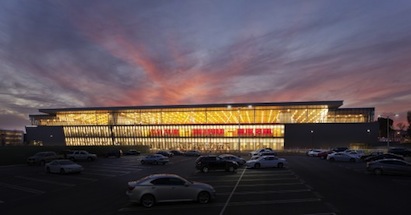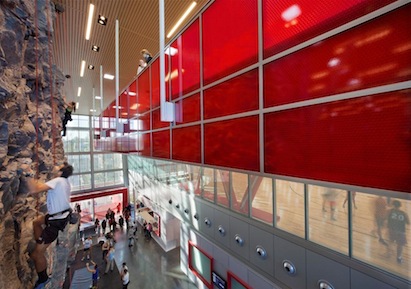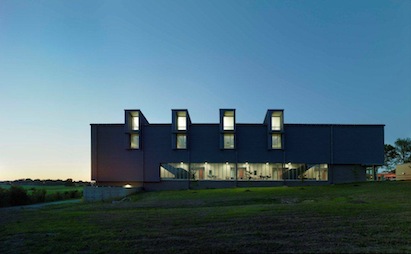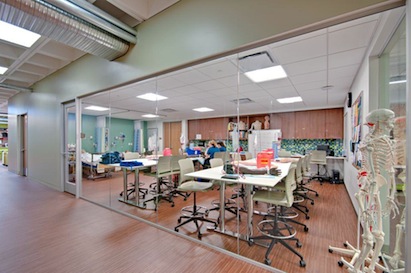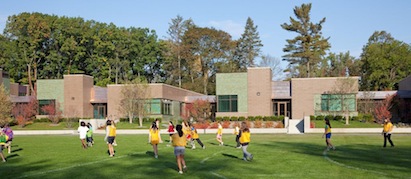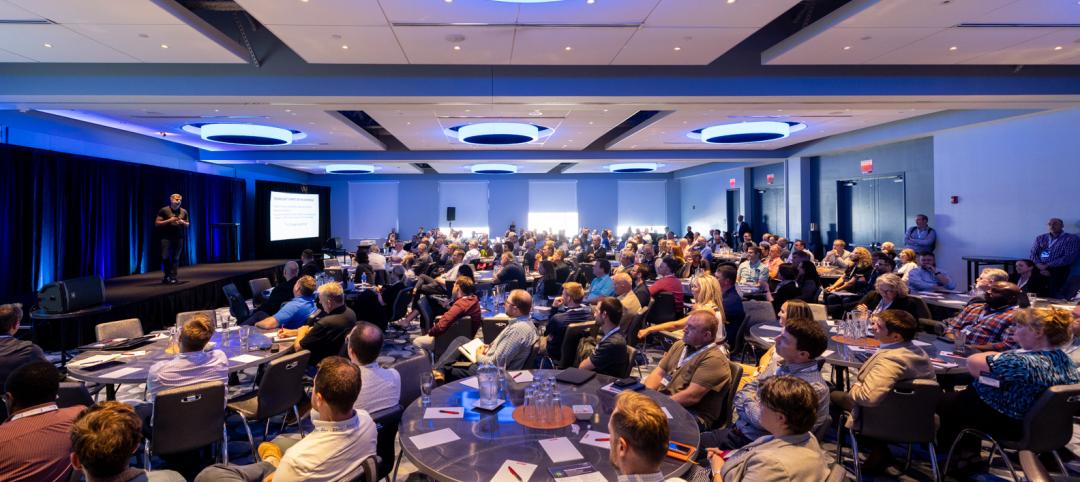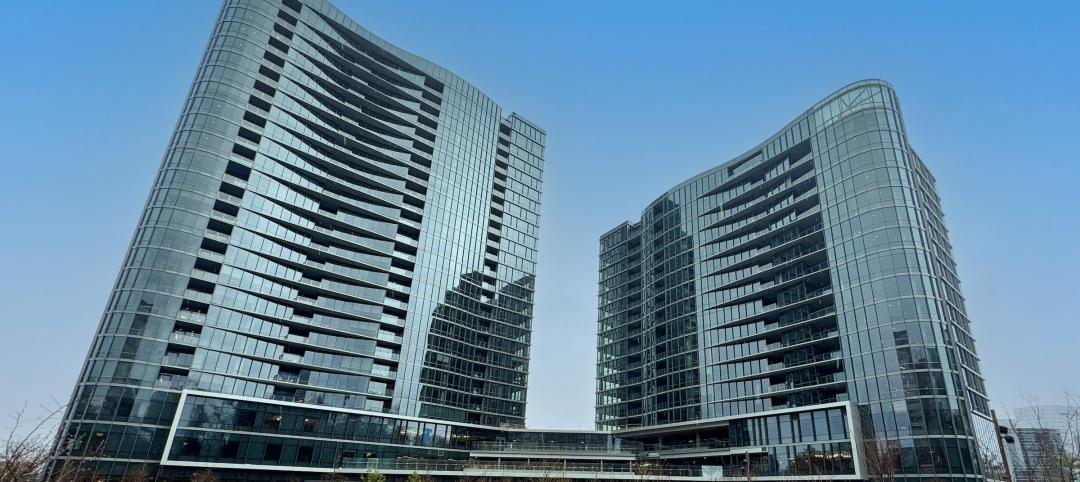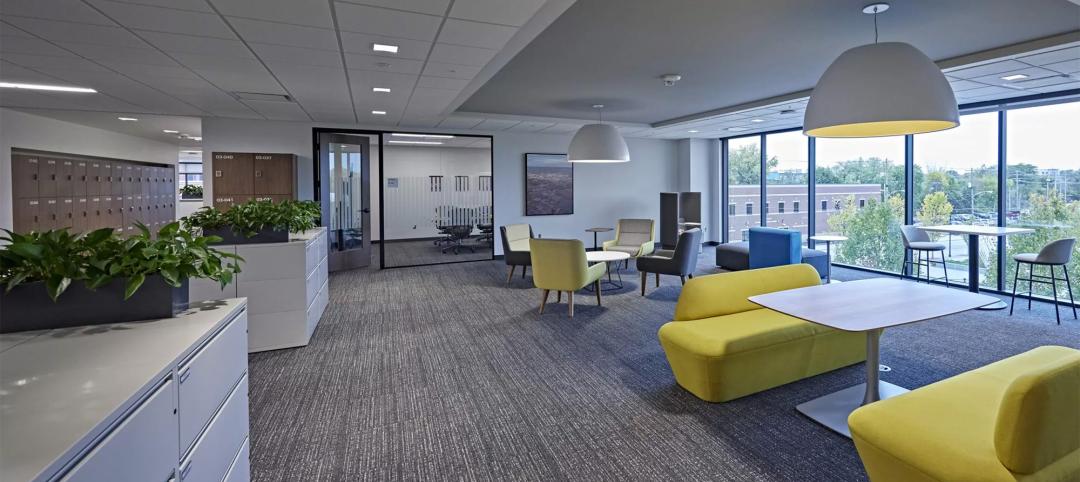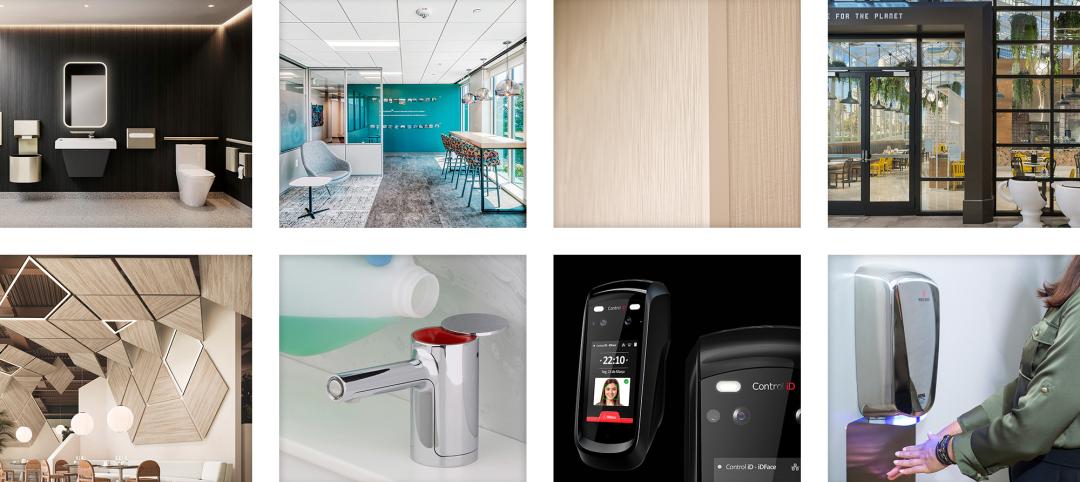Washington, D.C. – The American Institute of Architects (AIA) Committee on Architecture for Education (CAE) has selected five educational and cultural facilities for this year’s CAE Educational Facility Design Awards. The CAE Design Excellence Award honors educational facilities that the jury believes should serve as an example of a superb place in which to learn, furthering the client's mission, goals and educational program while demonstrating excellence in architectural design. These projects exemplify innovation through the client's educational goals through responsive and responsible programming, planning and design. Function and surrounding regional and community context are valued as part of the planning and design process.
California State University, Northridge Student Recreation Center; Northridge, California
LPA, Incorporated
The Student Recreation Center strategically creates a strong bookend to the east end of the campus, providing a dynamic, energetic approach to recreation. The design concept is clearly executed with a judicious use of colors and finishes. Upon entering the building natural lighting and material choices raise excitement and motivate movement. As an athletic building, it captures the energy and impetus of the various sporting activities inside. Strong transparency and interconnections between spaces inside the building are appealing, inviting and conducive to exercising. Compositionally it is assured and confident. Its community connection is highly apparent. Rainwater collection, natural ventilation, and day lighting are strong sustainable design features that are nicely integrated into the design. It was evident to the jury that students were involved in the conceptualization process and planning.
Sandy High School; Sandy, Oregon
Dull Olson Weekes – IBI Group Architects
Breathtakingly detailed as a public school, Sandy High School sets very high standards in terms of materials, finishes and aesthetics. Sitting lightly on the land, the building allows nature to penetrate the campus. It takes advantage of the hillside and creates panoramic views while nestling comfortably on the contours. Visible green roofs below adjacent classrooms add to hillside views while remaining roof areas are opportunities for power generation. Transparency between classrooms and common areas is executed boldly, with floor to ceiling glass suggesting a confidence with the user groups. Single loaded corridors were used to great effect by allowing natural light into both sides of learning spaces. Exterior treatments reflect the region in a wonderful and indigenous way and incorporate pleasant verandas with deep overhangs. The usable space per student and color combinations contribute to and promote student development.
Hinds Community College Jobie L. Martin Classroom Building; Jackson, Mississippi
Duvall Decker Architects
This simple and honest building with strong forms and an elegant façade shows that a few simple gestures can render a sense of identity to an otherwise nondescript campus. The rigorous use of materials, straightforward detailing, and clarity of concept elevates the modest program to a new level. The jury admired the light airy classrooms that combined the translucent, transparent, fixed, and operable glazing.
Mesa Community College Health Wellness Building; Mesa, Arizona
SmithGroupJJR
The transformation of this postindustrial concrete building into a light filled, translucent learning environment is exceptional. This project sets a high standard for reuse and repurposing of an existing building and demonstrates how constraints can benefit and strengthen a project. The conversion of leftover space between buildings creates dynamic and interactive circulation opportunities. The exterior is striking in its bold gestures, especially at night.
Cranbrook Kingswood Girls’ Middle School; Bloomfield Hills, Michigan
Lake|Flato Architects
This design integrates form and function in ways reminiscent of the Crow Island School. The building is indicative of an independent language that fits well within the campus context. Cranbrook Kingswood Girls' Middle School is beautifully detailed, appropriately contextual in a place where expectations are very high, modest in scale, yet intimate. The variety of shared common learning spaces connects directly to the exterior while providing opportunities to integrate imaginative ideas into the educational environment. The scale of the interstitial spaces and classrooms give a very secure feeling to the learning environment. This school builds on great traditions but creates a quality and life of its own.
Jury
The 2013 CAE Educational Facility Design Awards jury includes: Steven M. Shiver, AIA, Chair, NAC Architecture; John R. Dale, FAIA, Harley Ellis Devereaux; Linda Nelson Keane, AIA; Victor Sidy, AIA, Taliesin School of Architecture and C. Kenneth Tanner, University of Georgia.
About the Committee on Architecture for Education (CAE)
The CAE is a large and active group of architects and allied professionals concerned with the quality and design of all types of educational, cultural, and recreational facilities. While a large portion of CAE members practice in the K-12 and post-secondary education markets, they look to serve the needs of those in the entire pre-K to 99 markets. CAE identifies national educational facility issues critical to architects and works to strengthen relationships with allied organizations, client groups, and the public.
About The American Institute of Architects
Founded in 1857, members of the American Institute of Architects consistently work to create more valuable, healthy, secure, and sustainable buildings, neighborhoods, and communities. Through nearly 300 state and local chapters, the AIA advocates for public policies that promote economic vitality and public well being. Members adhere to a code of ethics and conduct to ensure the highest professional standards. The AIA provides members with tools and resources to assist them in their careers and business as well as engaging civic and government leaders, and the public to find solutions to pressing issues facing our communities, institutions, nation and world. Visit www.aia.org.
Related Stories
AEC Tech Innovation | Jul 4, 2024
Caution competes with inevitability at conference exploring artificial intelligence for design and construction
Hosted by PSMJ, AEC Innovate in Boston found an AEC industry anxiously at the threshold of change.
Building Team | Jul 3, 2024
So you want to get published: What’s next?
In the AEC industry, securing media attention is no longer a niche endeavor but an essential component of a holistic marketing strategy.
Laboratories | Jul 3, 2024
New science, old buildings: Renovating for efficiency, flexibility, and connection
What does the research space of the future look like? And can it be housed in older buildings—or does it require new construction?
MFPRO+ New Projects | Jul 2, 2024
Miami residential condo tower provides a deeded office unit for every buyer
A new Miami residential condo office tower sweetens the deal for buyers by providing an individual, deeded and furnished office with each condo unit purchased. One Twenty Brickell Residences, a 34-story, 240-unit tower, also offers more than 60,000 sf of exclusive residential amenities.
Student Housing | Jul 1, 2024
Two-tower luxury senior living community features wellness and biophilic elements
A new, two-building, 27-story senior living community in Tysons, Va., emphasizes wellness and biophilic design elements. The Mather, a luxury community for adults aged 62 and older, is situated on a small site surrounded by high-rises.
Office Buildings | Jul 1, 2024
Mastering office layouts: 5 primary models for maximum efficiency and productivity
When laying out an office, there are many factors to consider. It’s important to maximize the space, but it’s equally important to make sure the design allows employees to work efficiently.
Smart Buildings | Jul 1, 2024
GSA to invest $80 million on smart building technologies at federal properties
The U.S. General Services Administration (GSA) will invest $80 million from the Inflation Reduction Act (IRA) into smart building technologies within 560 federal buildings. GSA intends to enhance operations through granular controls, expand available reporting with more advanced metering sources, and optimize the operator experience.
Sustainability | Jul 1, 2024
Amazon, JPMorgan Chase among companies collaborating with ILFI to advance carbon verification
Four companies (Amazon, JPMorgan Chase, JLL, and Prologis) are working with the International Living Future Institute to support development of new versions of Zero Carbon Certification.
K-12 Schools | Jul 1, 2024
New guidelines for securing schools and community spaces released by the Door Security and Safety Foundation
The Door Security and Safety Foundation (DSSF), in collaboration with Door and Hardware Institute (DHI), recently released of “Are Your Door Openings Secure?.” The document provides guidelines to equip school administrators, building management personnel, and community leaders with a clear roadmap to create a secure and safe environment.
Products and Materials | Jun 30, 2024
Top products from AIA 2024
This month, Building Design+Construction editors are bringing you the top products displayed at the 2024 AIA Conference on Architecture & Design. Nearly 550 building product manufacturers showcased their products—here are 17 that caught our eye.


